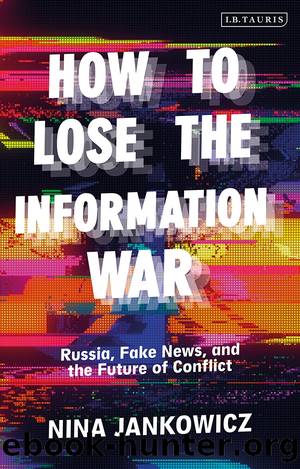How to Lose the Information War: Russia, Fake News, and the Future of Conflict by Nina Jankowicz

Author:Nina Jankowicz
Language: eng
Format: epub
Tags: Russia, propaganda, democracy, information age, social media
ISBN: 9781838607692
Publisher: Bloomsbury
6
Czech Republic: Fighting Lies Means Fighting Opinion
History is hard to escape in Prague.
It’s 5:00 a.m. on a Friday and I’m catching an Uber to the airport after my third trip to the city this year. Today is a public holiday, “Struggle for Freedom and Democracy Day,” which marks the anniversary of the 1939 student revolt against the Nazi occupation of Czechoslovakia that led to the storming of Prague University and execution of nine of its student leaders. It’s also the anniversary of the demonstration thirty years later that began the Velvet Revolution and Czechoslovakia’s ultimate rejection of communist rule.
My driver, Jiří, is chatty, despite the early hour and the somber occasion; he’s an economics student trying to make some extra money while at university. “It’s a great opportunity if you have a car,” he says of his side job, “especially on a night like tonight.” He has been up all night driving partiers who decided to mark today’s public holiday with a night of drinking. “It’s nice to finally have a passenger who can say a proper sentence,” he jokes.
He wants to know what I think of Prague. The truth is that I didn’t like it at first. Especially coming from Kyiv, it felt like an Eastern European Disneyland, where men at stag parties in search of cheap beer and brothels kid themselves into thinking they got a taste of life behind the former Iron Curtain by staggering around Prague’s historical center, blindingly drunk and seemingly unaware that this part of town hardly represents Prague’s communist history. But as I returned and explored Prague’s residential neighborhoods, I found myself growing more enamored of the pastel façades, fairytale parks, and art nouveau details despite my strange affinity for Soviet brutalist structures. “It took a while, but I really like it here now. Especially this area,” I say to Jiří, as we stop at a light at the edge of Letná, where I’ve been staying.
“Most of the buildings here are older than your country!” Jiří says, incredulous that it wasn’t love at first sight for his city and me. When he drops me off at the airport later, he neglects to end the trip and instead goes for a joy ride around town, charging me three times as much as what I would have otherwise paid. Jiří’s economics degree is evidently working well for him.
*
Prague’s architecture is indeed a splendid reminder of a refined and dignified era. Well-preserved and striking, it sparkles on, trying hard to outshine the more recent, more gruesome past—one that’s closer to Jiří’s attempt to swindle me than any postcard-worthy building. Take the Czernin Palace, for example. Built in the seventeenth century, its domineering exterior looks out toward the spires of Prague Castle. The Czech Republic’s Ministry of Foreign Affairs is housed in a utilitarian Soviet structure tucked behind the stately old building, so as not to cause offense to the casual tourist. The palace itself is used for official diplomatic functions these days.
But the majestic façades of these buildings mask the uglier truths of their interior histories.
Download
This site does not store any files on its server. We only index and link to content provided by other sites. Please contact the content providers to delete copyright contents if any and email us, we'll remove relevant links or contents immediately.
| Arms Control | Diplomacy |
| Security | Trades & Tariffs |
| Treaties | African |
| Asian | Australian & Oceanian |
| Canadian | Caribbean & Latin American |
| European | Middle Eastern |
| Russian & Former Soviet Union |
The Secret History by Donna Tartt(16645)
The Social Justice Warrior Handbook by Lisa De Pasquale(11492)
Thirteen Reasons Why by Jay Asher(7797)
This Is How You Lose Her by Junot Diaz(5791)
Weapons of Math Destruction by Cathy O'Neil(5045)
Zero to One by Peter Thiel(4832)
The Myth of the Strong Leader by Archie Brown(4795)
Promise Me, Dad by Joe Biden(4453)
Beartown by Fredrik Backman(4429)
Stone's Rules by Roger Stone(4421)
How Democracies Die by Steven Levitsky & Daniel Ziblatt(4407)
The Fire Next Time by James Baldwin(4349)
100 Deadly Skills by Clint Emerson(4084)
A Higher Loyalty: Truth, Lies, and Leadership by James Comey(4038)
Rise and Kill First by Ronen Bergman(4017)
The David Icke Guide to the Global Conspiracy (and how to end it) by David Icke(3890)
The Farm by Tom Rob Smith(3878)
Secrecy World by Jake Bernstein(3787)
The Doomsday Machine by Daniel Ellsberg(3736)
